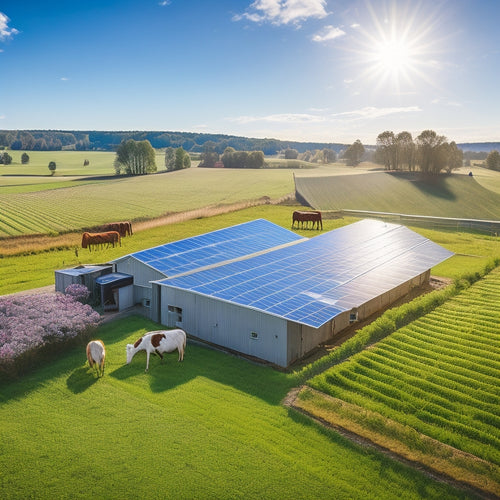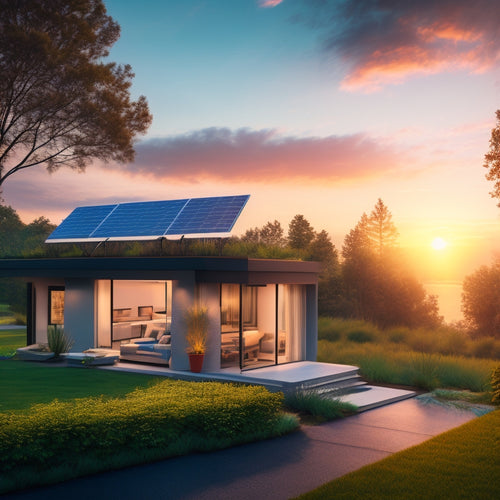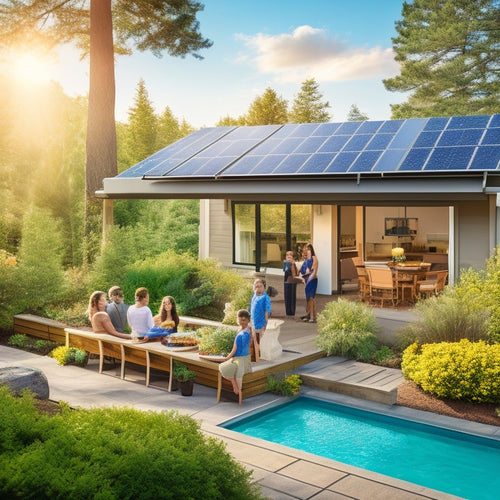
Emergency Backup Systems for Your Home
Share
You're taking a smart step by considering an emergency backup system for your home. Solar power backup systems offer energy independence, cost savings, and environmental benefits. By storing excess energy generated during the day, you'll have a reliable supply during grid outages or energy shortfalls. When choosing a solar battery, consider capacity, energy efficiency, and power density to guarantee it meets your vital appliance needs. Proper installation, maintenance, and monitoring are essential to peak performance. As you investigate the world of emergency backup systems, you'll uncover the complexities of system design, installation, and upkeep, which will ultimately guarantee your home stays powered when you need it most.
Key Takeaways
- Emergency solar systems provide energy independence and minimize reliance on the grid during power outages.
- Solar power backup systems store excess energy generated during the day for later use.
- Choosing the right solar battery with sufficient capacity and efficiency ensures reliable backup power for essential appliances.
- Proper installation and maintenance of solar power backup systems are crucial for safety, efficiency, and reliability.
- Regular maintenance, including inspections and software updates, prevents reduced battery longevity and system efficiency.
Understanding Solar Power Backup
Your home's reliance on solar power means you're already ahead of the game regarding reducing your carbon footprint, but what happens when the sun dips below the horizon or during extended periods of inclement weather?
To guarantee a steady supply of electricity, you need a reliable backup system. This is where off-grid solutions come into play. A well-designed backup system can store excess energy generated by your solar panels during the day, allowing you to draw on it when needed.
Systems with advanced algorithms and quality components enhance charging efficiency, reducing battery drain and guaranteeing a larger reserve of power.
Solar panel efficiency plays an essential role in this process, as it directly affects the amount of energy available for storage. A high-efficiency system can provide a larger reserve of power, assuring you stay connected even when the grid is down.
Benefits of Emergency Solar Systems
Emergency solar systems offer a trifecta of benefits: energy independence, financial savings, and peace of mind. By installing an emergency solar system, you'll reduce your reliance on the grid and enjoy significant cost savings on your energy bills.
Plus, you'll be doing your part to minimize your environmental impact. With off-grid solar systems, you can achieve community empowerment and strengthen local resilience through adaptability to changing circumstances and crises.
Some key advantages of emergency solar systems include:
- Reduced carbon footprint and lower greenhouse gas emissions
- Lower energy bills thanks to free energy from the sun
- Energy independence during grid outages or natural disasters
- Increased property value with a sustainable energy solution
- Low maintenance requirements with durable, long-lasting components
Choosing the Right Solar Battery
As you prepare to harness the power of solar energy, selecting the right solar battery becomes a vital component of your emergency backup system.
You need to take into account battery capacity, measured in watt-hours (Wh), to guarantee it can power your essential appliances during an outage. A higher capacity battery will provide longer backup times, but it also increases the cost.
When evaluating battery performance, look for metrics such as energy efficiency and power density to guarantee peak energy storage.
Inverter compatibility is another key factor, as it guarantees seamless integration with your solar panel system. Look for a battery with a compatible inverter to enhance energy conversion and storage.
Additionally, take into account the battery's depth of discharge (DOD), round-trip efficiency, and warranty when making your selection.
Installing Solar Power Backup Systems
Installing Solar Power Backup Systems
Once you've selected the right solar battery, it's crucial to install it correctly to guarantee a seamless and efficient shift to backup power during an outage. Proper installation guarantees your energy storage options are optimized, and your solar panel installation works in harmony with your backup system.
To achieve a successful installation, consider the following:
-
Hire a licensed electrician with experience in solar panel installation to connect your solar panels to the battery and backup system.
-
Install the battery in a well-ventilated area, away from flammable materials and children.
-
Verify all electrical connections are secure and meet local building codes.
-
Consider adding a monitoring system to track your energy production and storage.
-
Perform a thorough system test to identify and address any potential issues before an outage occurs.
Maintaining Your Solar Backup System
You've successfully installed your solar backup system, and now it's running smoothly. However, regular system maintenance is vital to guarantee it continues to perform at its best. Neglecting maintenance can lead to reduced battery longevity and overall system efficiency.
| Task | Frequency | Importance |
|---|---|---|
| Inspect and clean solar panels | Quarterly | High |
| Check and top off battery water levels | Monthly | Medium |
| Update system software and firmware | Semi-annually | Low |
| Perform full system checks and diagnostics | Annually | High |
Frequently Asked Questions
Can I Use My Solar Backup System for Camping or RV Trips?
Imagine yourself surrounded by nature, camping under the stars, and enjoying the great outdoors. You can take your portable power on the go, as your solar backup system is designed for camping convenience, allowing you to power up your RV or campsite with ease.
Will a Solar Backup System Increase My Home's Value?
When you install a solar backup system, you'll likely increase your home's value, as it'll be viewed as a desirable feature during a home appraisal, showcasing your commitment to energy independence and reducing reliance on the grid.
Are Solar Backup Systems Environmentally Friendly?
Like a refreshing gust of wind, you'll find solace in knowing that solar energy is a guiding light of sustainability, producing zero emissions or pollution, making it an environmentally friendly choice for you, aligning perfectly with your pursuit of sustainable living.
Can I Add a Solar Backup System to an Existing Solar Panel Array?
You can seamlessly integrate a solar backup system into your existing solar panel array, expanding your backup power options through efficient solar panel integration, which involves evaluating your current system's compatibility and configuring the new backup system to work in harmony.
Are There Any Government Incentives for Purchasing a Solar Backup System?
You'll be pleased to know that, yes, there are government incentives for purchasing a solar backup system, including tax credits and rebate programs, which can greatly offset the upfront costs and make your investment more affordable.
Related Posts
-

What Do I Need to Know About Farm Solar Panels
When considering farm solar panels, you need to assess costs, benefits, and technical specifics. Initial investment c...
-

The Future of Residential Energy Storage
The future of residential energy storage looks promising and cost-effective for you. With lithium-ion battery prices ...
-

Top-Rated Home Solar Power Kits for Achieving Energy Independence
Top-rated home solar power kits enable you to achieve energy independence by greatly cutting your energy costs. You c...


